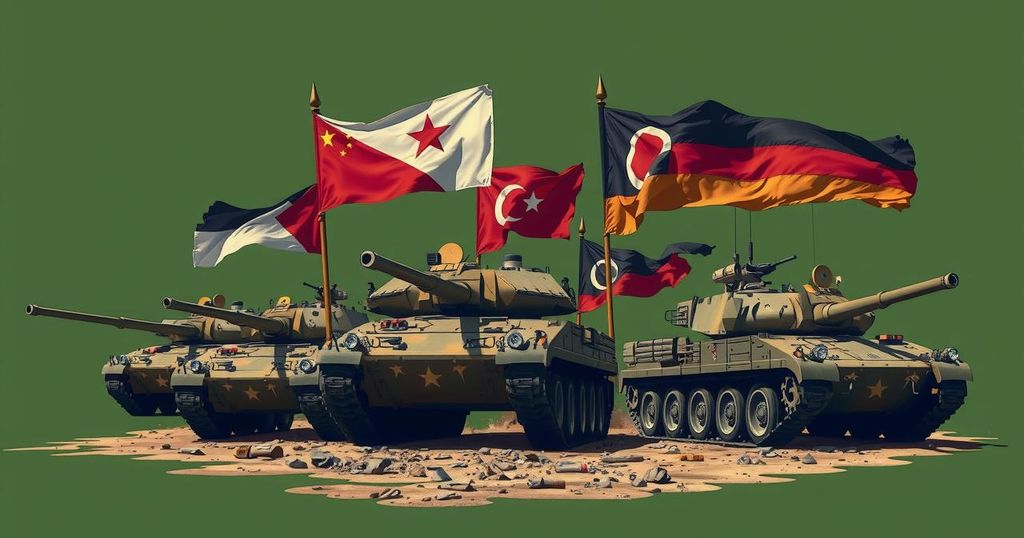Iraq’s parliament has initiated discussions on the PMF law aimed at integrating the Popular Mobilization Forces into state forces amidst U.S. calls for accountability to the Iraqi Prime Minister rather than Iran. Controversies regarding retirement ages and political affiliations among PMF leadership highlight the internal political struggles in Iraq. U.S. concerns about Iran’s influence on the PMF continue to be pronounced in discussions surrounding the law.
On March 24, 2025, Iraqi lawmakers conducted their first hearing regarding the contentious Popular Mobilization Forces (PMF) law. The objective of this legislation is to integrate the PMF into the framework of state forces. Concurrently, U.S. officials emphasized that groups operating under the PMF should be accountable to the Iraqi Premier, rather than external influences such as Iran.
The PMF was formed in 2014 amid the Islamic State (ISIS) crisis when the terrorist organization seized significant territories in Iraq. Initial efforts to establish a legal structure for the PMF were made in 2016, but the previous law only included three articles and lacked comprehensive details, creating uncertainty around the PMF’s operational functionality within Iraq’s security forces.
In response to ongoing issues, the Iraqi Council of Ministers recently approved a new PMF Service and Retirement Law aimed at formalizing the PMF’s integration into national forces. An official noted that this initiative is part of broader security reforms, focusing on organizing the PMF similarly to state military entities. However, Prime Minister Mohammed Shia’ al-Sudani withdrew the draft law due to internal political disputes.
Divergent interests among Shiite political blocs have emerged, particularly regarding a proposed mandatory retirement age of 60 for PMF members, which could lead to the dismissal of senior command figures like Chairman Falih al-Fayyadh. In contrast, Fayyadh and his allies are resisting changes that may undermine their influence in the PMF, with Fayyadh recently consulting with Iranian officials to gather support against the law.
Moreover, U.S. officials have consistently voiced concern over the PMF’s connections to Iranian-backed militias, warning that such affiliations pose risks to Iraq’s military integrity. Tammy Bruce, a U.S. State Department spokesperson, reiterated the need for Iraq to assert control over all security forces within its territory, stressing that the PMF must operate under the authority of the Iraqi Prime Minister.
The proposed 18-provision bill seeks to place the PMF under the direct command of the Prime Minister and delineate its responsibilities, which include national defense, counter-terrorism, and maintaining Iraq’s geographical and constitutional integrity. The draft law also proposes excluding PMF members from political affiliations to prevent conflicts of interest.
The PMF’s leadership is expected to prioritize experienced military personnel in their ranks, specifically the chairman and the chief of staff roles. Each will require a university education and extensive military experience. Additionally, the PMF will have its own military academy to enhance personnel training and operational readiness.
As the PMF law proceeds through the parliamentary process, its success may indicate a resolution among competing political factions, facilitating further legislative actions. The prospective law promises to consolidate the PMF’s rights, benefits, and personnel from the earlier 2016 law into a new legal framework upon its anticipated approval.
The recent developments surrounding the Popular Mobilization Forces (PMF) law reflect complex political dynamics within Iraq. The integration of the PMF into national forces seeks to address both operational effectiveness and external influence, particularly from Iran. U.S. officials emphasize the need for Iraq to establish control over its security forces. The fate of the PMF law will ultimately shape Iraq’s military landscape and its relations with both regional and global powers.
Original Source: www.rudaw.net




